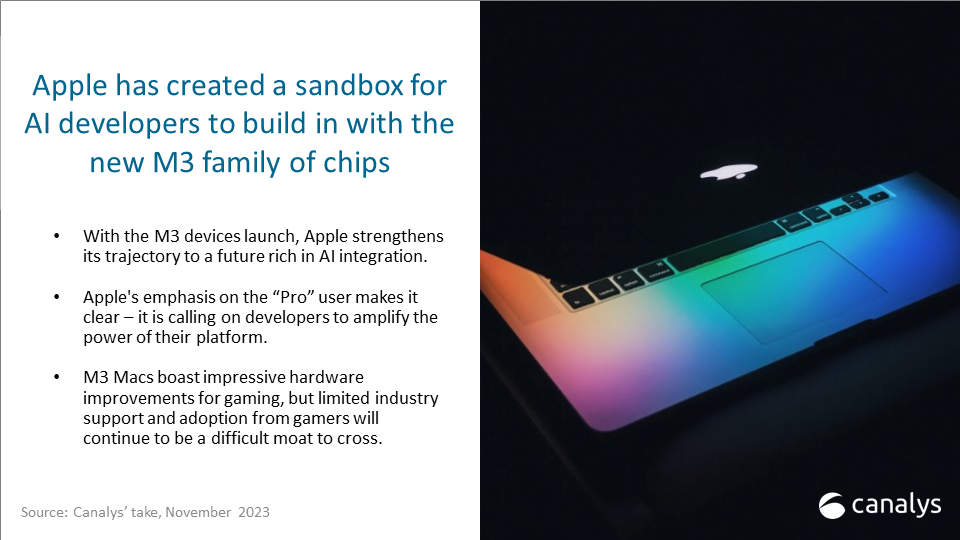AI’s evolving ecosystem: takeaways from the Dreamforce and Ray Summit AI conferences
30 October 2023
Canalys is part of Informa PLC
This site is operated by a business or businesses owned by Informa PLC and all copyright resides with them. Informa PLC’s registered office is 5 Howick Place, London SW1P 1WG. Registered in England and Wales. Number 8860726.

In a PC market obsessed with AI integration, Apple's recent launch of the M3 family of chips has sparked considerable interest in the future of AI on Mac. During the event, Apple focused on its community of "Pro" users, a call to developers to leverage the biggest hardware advances in Apple Silicon since the introduction of M1 and to amplify their platform.

At its "Scary Fast" event, Apple highlighted its silicon improvements in performance, power efficiency and portability. With the launch of M3 devices, Apple has strengthened its trajectory toward a future rich in AI integration at a time important for the PC industry.
The event was Apple’s first explicit mention of AI in its marketing since the release of ChatGPT in November 2022. Since then, Microsoft and its partners have taken significant strides in outlining their vision of on-device AI functionality for PCs. The timing of the M3 announcement is important as the countdown is on for Apple to solidify its story for AI on Macs. Third-party developers have been building on the platform for decades, but now the question Apple will need to answer is - will it be enough to combat a renewed Windows value proposition?
AI integration has been at the forefront of the PC industry since early this year. The proposed new era of Windows computing has focused on improvements to productivity and personalization. Apple’s market share in the commercial PC segment has steadily increased since its transition to its own silicon, but these gains now face a new threat. A substantial PC refresh cycle coinciding with the end-of-life for Windows 10 is on the horizon and Microsoft, along with its OEM and chipset partners, is betting big on AI integration to make a compelling case for customers to remain locked into the Windows ecosystem. The announcements of Intel’s Meteor Lake series, AMD’s Ryzen 7040 Series and Qualcomm’s X Elite represent the beginning of a roadmap toward wider proliferation of on-device AI for Windows across both x86 and ARM architectures. The new M3 Macs can certainly keep pace with the technical hardware improvements seen by Microsoft and its partners. Still, collaboration with developers will be key while Apple continues to build its own large language model.
Apple is known for charting its own course and is unlikely to be swayed by the steps its competitors take. In its vision for the future of AI, Apple must leverage its strong association with data privacy, its positioning with content creators and its ability to deliver quality user experiences across its ecosystem. These lie at the heart of Apple's approach and will remain as guiding principles. A clear advantage Apple has is in the interoperability of its ecosystem, which has featured strongly recently in its "Mac Does That" campaign, highlighting the fluidity of moving tasks between devices. Hardware ecosystems are not unique to Apple and announcements like Qualcomm’s "Snapdragon Seamless" reveal that other industry players are increasing their focus on them. But for now, Apple’s strength lies in its control over silicon, hardware and software and the clarity that its users have on which devices will work together.
Elsewhere, Apple has taken positive steps in improving gaming support. But when it comes to gaming, Mac is playing catch up. GPUs for Windows PCs have had hardware-accelerated ray tracing capabilities for several years. What is impressive is that Apple has done this all on a single piece of silicon which the vendor claims can achieve the same performance at half the power compared to the M1. The issue for Mac’s gaming ambitions does not stem from hardware limitations but from platform economics. Not enough gamers use Mac so developers do not build games for Mac users. Mac has a large moat to cross before gamers widely use it. AI applications for Mac, however, do not have a moat but a bridge.